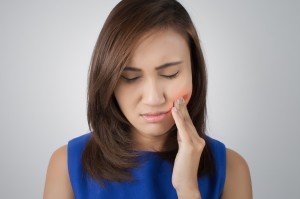 Canker sores are the worst! I’m never really sure why they pop up, and when they do they last for days. Is there any way I can prevent them or make them go away faster?
Canker sores are the worst! I’m never really sure why they pop up, and when they do they last for days. Is there any way I can prevent them or make them go away faster?
We agree! Canker sores are truly one of the most annoying oral problems because of the way they seemingly come out of nowhere, always seem to be in the worst spot in your mouth, and can be quite painful for several days.
Scientists are still unsure as to what exactly causes these sores, which can make them difficult to treat. However, they are in general considered to develop due to a minor allergic reaction or immune response. Many foods are known to cause canker sores, particularly acidic foods and vegetables like pineapple, lemons, and tomatoes, but nuts, chocolate, coffee, eggs, and spicy foods are also known triggers.
Canker sores can also develop due to stress, hormonal shifts, and minor injuries in the mouth, such as scrapes from braces, dentures, or dental tools. There also seems to be a genetic component, as people who suffer from canker sores tend to have others in their family who do, too.
There are a few different kinds of canker sores: simple, complex, major, and herpetiform sores. Here’s a quick breakdown:
Simple (or minor): Small, round or oval-shaped sores that are painful for 1-3 days and heal in about 1 week.
Major: Large (1/2” or larger) and penetrate deep into mouth tissue. They are round, very painful, and can take up to six weeks to heal. Major sores are also prone to scarring.
Complex: Sores that develop due to other underlying health issues, such as immune disorders, vitamin deficiencies, or gastrointestinal diseases.
Herpetiform: Very small sores that occur in large clusters (anywhere from 10-100+ sores). They are, however, not caused by the herpes virus.
Another important distinction to make when dealing with canker sores is that they are not the same as a cold sore. The latter is caused by the herpes simplex type 1 virus are highly contagious, fluid-filled blisters that commonly form outside the mouth. Canker sores are not caused by a virus, are not contagious, and are almost always found inside the mouth.
If you’re not sure where your canker sores are coming from, first try keeping track of the foods you eat to see if there are any dietary triggers. If you can’t identify any particular food that may be causing the sore, think about whether other irritants, such as dentures or braces, could be causing them. If that also doesn’t seem to be a factor, it could be another underlying health issue such as a vitamin deficiency, and it may be worth talking to your doctor about and getting a blood test.
Before a canker sore develops, you may feel a tingling or burning sensation in your mouth. When the sore emerges, it will often be white, yellow or gray with a red ring around the edge. The sores can develop in many areas of the mouth, such as in the lining of the cheek or lips or on the tongue or soft palate. The location of the sore can also play a role in how painful or irritating it is. Sores (unfortunately!) tend to develop along the cheeks, tongue and lips where they can be easily bitten or irritated by the movement of the teeth or jaw. We know it might be hard to not bite on a sore or fiddle with it with your tongue, but do try to resist! A sore that isn’t irritated will be more likely to heal faster and be less painful.
Although most canker sores will only be painful for a day or two, it usually takes up to a week or so until they fully disappear. If your canker sore is particularly large or painful, there are over-the-counter salves, ointments, and antimicrobial rinses that can help bring relief and speed up the healing process. In severe cases, your doctor or dentist may prescribe an oral steroid or ulcer medication, and in rare cases, a sore may even need to be cauterized.
Although there’s currently no way to prevent sores entirely, you can certainly treat the underlying issues. Avoid foods that you know trigger canker sores, and consult with your doctor or dentist about whether or not an immune or gastrointestinal disorder or vitamin deficiency may be the culprit — a change in medication or dietary supplement could help fix the issue. Your dentist can also adjust your braces, dentures, or retainer if they are irritating your mouth and causing canker sores as well.
If you have a canker sore, try eating only soft, bland foods — very hot, spicy, or sharp foods can cause the sore to be more irritated and painful. Be sure to brush your teeth regularly and rinse with mouthwash in order to keep the sore clean and free from infection. If the sore persists for two or more weeks or if it’s very large and particularly painful, talk to your dentist about whether additional treatment options could help.
Got any lingering questions about canker sores? Let us know in the comments below!







Leave a Reply